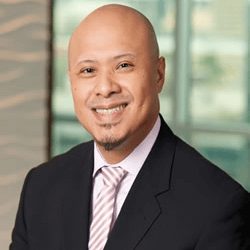Dr. Kenneth A. Kavajecz serves as Dean of Whitman School of Management at Syracuse University. He is an experienced academic administrator, having served successfully as associate dean for the Undergraduate and M.B.A. programs at the Wisconsin School of Business. Under his leadership, both the undergraduate and M.B.A. programs at Wisconsin improved demonstrably, with the M.B.A. program moving into the top 25.
Dr. Kavajecz has focused much of his research on the structure of financial markets, with an expertise in liquidity, trading, risk management, market structure and regulation. His work has been published in the Journal of Finance, Journal of Financial Economics, and the Review of Financial Studies.
Academic awards received by Kavajecz include the 2000 Financial Management Association best micro structure paper “Liquidity Provision during Circuit Breakers and Extreme Market Movements” and a nomination for the Smith Breeden Prize for the best paper in the Journal of Finance in 2005 for “Price Discovery in the U.S. Treasury Market: The Impact of Orderflow and Liquidity on the Yield Curve.” Kavajecz is also the recipient of the 2008 Gaumnitz Distinguished Faculty Teaching Award at the Wisconsin School of Business and the 1998 David W. Hauck Award for Outstanding Teaching in the undergraduate division at the Wharton School of the University of Pennsylvania.
1. How did you get started in your career as a Business Dean?
As a member of the academy, I always tried to continually challenge myself. I tried really hard to be a good researcher and instructor. Over time I was intrigued with the possibility/challenge of leading others to do the same. As such, I got involved with leading some (full-time MBA and undergraduate) programs. I enjoyed it so much that I thought I would try my hand at the business school dean role, which is what brought me to the Whitman School.
2. What do you think are some of the leadership qualities an effective Business Dean should have?
Interestingly, I believe an effective business dean needs to be a “jack-of-all-trades.” The skill set of an academic, or business professional, alone is insufficient. In fact you need both skill sets. In particular, a business dean needs to have a vision of where he or she wants to take the School; be able to communicate the vision, and necessary steps, to a wide array of constituencies; motivate those constituencies to commit/invest their energy, time and capital to advancing the vision and finally, be willing to take a stand against those who oppose change.
3. Business is constantly changing, what types of things is your school doing to make sure students are learning the most updated business information?
Indeed, business is continually evolving and business schools need to be at the forefront, in order to supply the human capital necessary to supply our business partners’ needs. Specifically, we are in regular dialogue with our corporate advisory boards about the changing trends and needs that our corporate partners are seeing. We take that input very seriously and incorporate it into our curriculum. Two recent examples are our full review and revision of our undergraduate curriculum this past year, as well as our heavy emphasis on pushing students to become Excel certified, as well as being much more deliberate about incorporating Excel into the curriculum.
4. Faculty play a critical role in the development of your student’s learning and in helping build their business competencies. What type of things are your faculty involved in and doing that makes their classroom unique to the student’s learning experience?
We have two complementary types of faculty at the Whitman School – research faculty and professors of practice. Both are instrumental to our curriculum and success. Research faculty are able to bring cutting-edge academic work, some of which was created by our own faculty, into the classroom to reinforce, and push the envelope on what the students learn in the classroom. Our professors of practice have ongoing connections to the business world and are able to bring both current practice and business leadership into the classroom. The result is exposure to cutting-edge academic work, as well as current practice and leadership for our students.
5. What type of qualifications and experiences do your faculty bring to the class? How do you make sure they stay updated in their area of expertise and field of study?
We have two types of faculty – research and professors of practice. Research faculty are steeped in the research in their respective fields. They are constantly striving to publish in the best academic journals and have ongoing interactions with colleagues, like them, at the cutting-edge of what we know. Professors of practice bring a wealth of experience many times spanning decades which bring not only a business savvy but also a wealth of contacts.
6. Do your students have input on faculty promotion, award and recognition program? If so, can you expand on this and provide examples?
Yes, students do have input on faculty promotions as well as award/recognition programs. Student representatives populate the Promotion and Tenure Committee in order for the student’s voice to be heard. Moreover, students annually are able to recognize faculty in a number of ways, for example by choosing the faculty of the year in both the graduate and undergraduate programs.
7. MBA degrees are still in high demand, but the competition is larger than ever. How does your MBA program differ from other schools?
The MBA program at the Whitman School is different from the competition in its focus on experiential learning. I find it curious that if you look at MBA programs, generally they are supposed to help people become managers; however, it is quite rare that MBA students ever receive any practice at managing. I understand that being an “apprentice” is often seen as an old-fashioned notion, but I believe that its import and relevance has not waned over the years. My plan is to help provide MBA students with the chance to experience management rather than just reading about it.
8. Almost every university is going online or trying to offer online degree programs. Your university has a rich history in thinking outside the box for offering online and hybrid options. Can you please tell me more about what makes your iMBA program unique to the student experience?
You are correct, the Whitman School does have a rich history in the online space. The iMBA was a pioneer in offering students the chance to earn their MBA online. Most recently we have partnered with 2U, Inc. to reinvigorate the iMBA into our online offerings of MBA@Syracuse and Accounting@Syracuse. Our experience teaching in the online format coupled with the state-of-the-art platform makes our program, manageable, incredibly engaging and a great value.
9. What do you think are some of the biggest challenges that business schools are facing now and what his your school doing to confront them?
I would say the biggest challenges facing business schools are two-fold. First, the landscape in higher education is going through a monumental shift in what and how it delivers value to students. There is no shortage of players in the market, all with very different value propositions related to costs, experiential learning, business connections and job placement. Each business school needs to understand where it can be competitive in that landscape. Second, the pressures to contain the cost of education/tuition coupled with the ever-rising costs of faculty squeezes business schools financially.
We at the Whitman School are addressing these challenges first by being very clear about our value proposition, which focuses on experiential learning, and try and communicate it ever so clearly so that prospective students are able to make informed choices on where they should attend. Second, we are investigating alternate avenues for revenues so we are able to offset some of the rising costs we face as a School.
10. We learned a great deal about you and your school. If I was a potential student or employer that was stuck between choosing two different MBA programs, what other things would you want me to know about your degree and school to help with my selection?
First of all, there are many great business schools out there and you are going to get a good education at virtually all of them. That said, a great education is “table-stakes” to play in this space. What prospective students should look for are (1) a good “fit” where they feel comfortable and where the faculty, staff and fellow students are going to push them to be better and (2) a place that will provide hands-on, experiential learning opportunities that are going to set them apart from others when it comes time to secure a job.

Dr. Emad Rahim is an award-winning entrepreneur, educator, author, community leader and TEDx Speaker. He currently serve as the Endowed Entrepreneur-in-Residence at Oklahoma State University and teaches at the Jack Welch Management Institute in the Executive MBA program. He was recognized by the United Nations Foundation as a 2013 Empact100 Honoree for his social entrepreneurship work, received a Congressional Award for his community service and was the recipient of the Forty Under 40 Business Leadership Award sponsored by Syracuse University. His personal story was turned into a short documentary, “Against the Odds,” and featured in the Huffington Post and Forbes. He co-authored “Leading Through Diversity: Transforming Managers Into Effective Leaders” and “The 4-Tions: Your Guide to Developing Successful Job Search Strategies” and is a frequent contributor to the Refractive Thinker book series, CEO Magazine, TweakYourBiz and YFS Entrepreneurship Magazine. Fellow him on Twitter @DrEmadRahim










